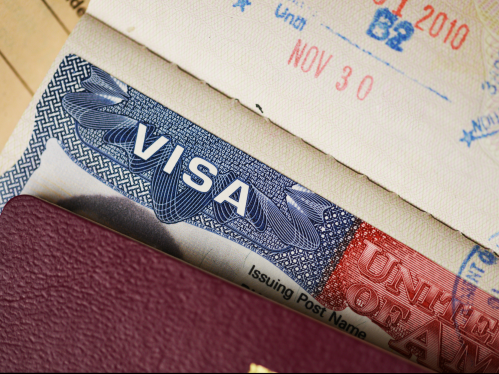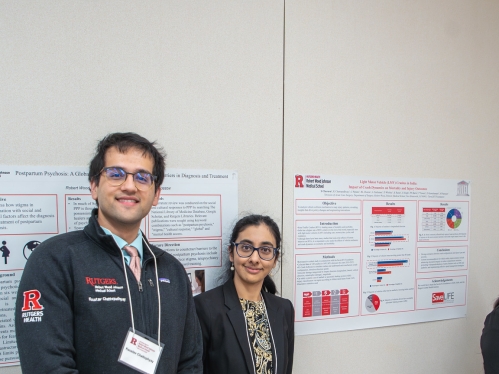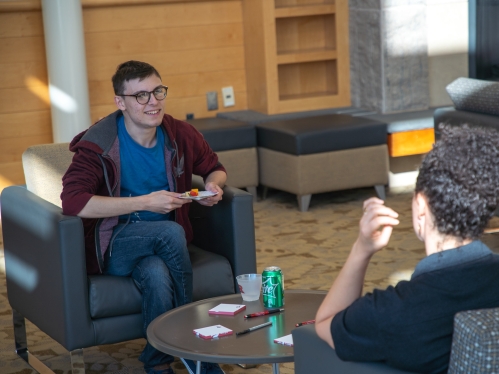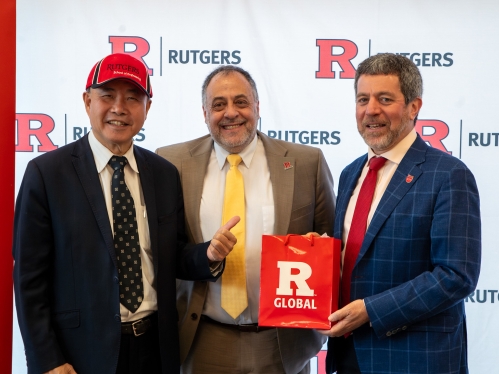
Rutgers Sponsoring Departments
Serving 1,400+ international scholars across Rutgers
Academic and research units enter into a cooperative arrangement with Rutgers Global when hosting international faculty and scholars at Rutgers under the university's visa sponsorship, and, when applicable, in serving as the sponsor of a green card for eligible employees.

Sponsoring J-1 Scholars
Rutgers departments need to apply for a DS-2019 Certificate of Eligibility on behalf of the sponsored scholar or research student so they may apply for a J-1 visa. You will be asked to provide certain information about the proposed activities, and you'll need to work with ISSS at Rutgers Global to ensure the smooth arrival of your sponsored scholars and research students.

Accordion Content
-
The J-1 Visa provides countless opportunities for international candidates looking to travel and gain experience in the U.S. The multifaceted programs enable foreign nationals to come to the U.S. to teach, study, conduct research, demonstrate special skills or receive on the job training for periods ranging from a few weeks to several years.
Below are the J-1 Visa categories that Rutgers is authorized to sponsor:
J-1 Visiting Research Student Category (Student Non-Degree)
Visiting research students must be enrolled in a degree seeking program outside of the U.S. and visiting Rutgers to conduct research that is necessary for, or integral to, completion of a degree at their home institution. This category is limited to a 2-year maximum stay.
J-1 Student Interns vs Visiting Research Students
The J-1 Student Intern category is reserved for students who are currently in a degree program abroad and seek to visit Rutgers to engage in a project/research-based internship that is integral to the curriculum of the home institution's degree program to which the intern will return. International student interns (paid or unpaid) may only work for their sponsoring department at Rutgers for up to 32 hours per week.
The J-1 Visiting Research Student category is reserved for students who are currently enrolled in a degree seeking program outside of the US, and are coming to Rutgers to conduct research that is necessary for, or integral to, completion of a degree at their home institution. Visiting Research Students (non-degree) may only be employed by the sponsoring department at Rutgers for a maximum of 20 hours per week. They can only work on projects that will enhance their approved research plan.
-
1. Review the Responsibilities and Liabilities for Sponsoring Departments and University Policy 60.1.2 on the Employment of Foreign Nationals
2. Determine whether Foreign National is eligible for an appropriate J-1 category (listed above). Contact ISSS for more information.
3. Issue an invitation/appointment letter to the scholar or research student. The letter should, at minimum, include:
- A signature from the Department Chair/Dean/Director;
- The exact length of time that the scholar or student will be sponsored (including start and end date);
- The amount of funding needed and where it will come from; and
- A description of program activities (in layperson’s terms).
4. Submit DS-2019 request in Sunapsis. If you do not have access to Sunapsis, please contact us at isss-facultyscholars@global.rutgers.edu.
5. Stay in touch with the scholar/exchange visitor throughout the process and keep ISSS informed of the scholar's or research student's arrival date. It is recommended that the scholar or research student arrive prior to their start date. Please be aware that the scholar or research student may arrive up to 30 prior to the program start date but cannot arrive more than 30 days after the program start date.
6. Assist the scholar or research student with ISSS check-in process in Sunapsis (if assistance is required) and ensure that program objectives are being followed.
-
-
Initial or Transfer: $250
-
Extension: $200
-
Expedite Fee (5 working days upon receipt of complete request): $200
-
Late Fee: $100
-
DS-2019 Reissuance Fee: $40
-
Insurance and Record Maintenance Fee: Vary according to program length. Fees are calculated via Sunapsis.
-
-
1. Invitation from host professor: 2 weeks
2. DS-2019 Request submitted in Sunapsis: 3 months (approx.)
- Visitor’s Information: 1 month
- Journal Entries: 2 weeks
- Appointment from Chair/Dean: 2 weeks
- Host Professor Certification: 1 week
- Chair/Director, Dean Approval: 1 week
- ISSS Fee/Insurance Review: 1 week
3. DS-2019 Issuance: 1-2 weeks for complete requests with no issues
4. Delivery of DS-2019 to scholar: 1 week
5. Wait time to schedule interview: 2-8 weeks (depends on location)
6. After interview, waiting for visa: 2 weeks
7. Booking flight and arrival: 2 weeks
Sponsoring Student Interns
The J-1 Student Intern Category is not to be confused with J-1 Students who are enrolled in a degree program at Rutgers. The J-1 Student Intern refers only to a student currently in a degree program abroad who visits Rutgers to engage in a project/research-based internship that is integral to the curriculum of the home institution's degree program to which the intern will return.

Accordion Content
-
- Must be a currently enrolled full-time student in the chosen career field at a degree or certificate-granting post secondary academic institution outside the U.S.
- Must have a sufficient grasp of the English language to function on a day to day basis.
- Must return to their academic program abroad to fulfill and obtain the degree after completion of the student internship program.
This program is not available to students who have graduated, or will be graduating before their internship ends.
- Must confirm the internship will fulfill the educational objectives of their current degree program.
- Must be approved by the home institution first, if Rutgers will financially support the student in any way.
- Must have sufficient funds to support their duration of stay such as support from home institution or personal/family funds. Rutgers University requires evidence of at least $447-$512/week for undergraduate and graduate student interns who are required to submit the Certificate of Funds form.
- Must have a passport valid for six months beyond the end of the internship period.
- Student must depart the U.S. within 30 days of the completion of the program.
- Must have/will purchase health insurance that meets the requirements set by Rutgers University when before arriving in the US.
- Must be a currently enrolled full-time student in the chosen career field at a degree or certificate-granting post secondary academic institution outside the U.S.
-
- Timeframe: Must be full‐time, at least 32 hours per week, as little as three weeks and at most, up to 12 months for each foreign degree or major.
- Conditions: Internships can be paid or unpaid, and this work-based learning position must not displace U.S. workers. Must provide a structured work‐based program using a Trainee/Intern Placement Plan (DS-7002) that will reinforce the student’s academic study upon return to the home institution. No more than 40% of the work can be remote, so two out of the five days can be remote and the rest of the time must be in-person.
-
Training: May not include an unskilled or casual labor position, and any position that requires or involves child care/elder care, aviation, or in clinical positions which involves patient care or contact (requiring medication, or other clinical or medical care). The position can require no more than 20% clerical work and SEE HERE for guidance on any program activities involving physical contact between exchange visitors and human participants and/or animal subjects. Rutgers Sponsoring Units must ensure the internship placement that is developed must these criteria.
- Location: All work must take place on-site, on Rutgers University property. No work may be performed at a third party location.
- Timeframe: Must be full‐time, at least 32 hours per week, as little as three weeks and at most, up to 12 months for each foreign degree or major.
-
-
English Language: Must confirm student’s English Language ability. (English Proficiency Form is required)
-
DS-7002: Must create a work‐based program using a Trainee/Intern Placement Plan. Short-term internships (for less than four months) will generally be for one phase. The training plan will reinforce the student’s academic study upon return to the home institution. Please click here for useful tips on how to complete the DS-7002 form.
-
Commit to visitor: The primary supervisor at Rutgers is required to be in close contact with the student during the internship and should not be away from campus for an extended period.
- Fees/Health Insurance: Must confirm student has health insurance which is equivalent to or greater than the coverage required by the University. Rutgers offers an insurance policy to meet this requirement for those J-1 visitors who do not have alternate insurance. Coordinate any related J-1 Student Intern Fees between the student and department.
- Pre-Arrival information: Provide assistance/support regarding local housing and accommodations. Also, must arrange for the student intern to be issued a Guest ID and a NetID.
-
-
- Mandatory Check-in: Students must check-in to Rutgers Global within 30 days of the start date of their internship. Students must use their NetID here and look for the “Student Intern Check-in Form” under “J-1 Scholar Services”. After checking in, the J-1 Advisor will reach out to meet for an orientation. If student fails to check in, the student will not be eligible to engage in the program or to legally remain in the US. If the student’s arrival is delayed and they are not able to check in within 30 days of the start date, the Rutgers Global–International Student and Scholar Services must be notified.
-
Extensions of Program: Extensions are not possible beyond the 12 month maximum set by the Department of State. If an extension request (within the 12-month limit) is made on behalf of the student, a completed evaluation must be submitted with the request for program extension along with a new DS-7002 form.
-
Evaluations: The Rutgers sponsoring unit/department is required to submit evaluations for each student intern. These evaluations must be completed prior to the conclusion of the internship program. Internships exceeding six months require midpoint and concluding evaluations. Internships of six months or less require concluding evaluations only.
-
Notice of Departure: Sponsoring supervisors and students must notify the J-1 Advisor of the student’s departure at the completion of the program. Failure to properly close the student’s program could lead to complications for future visits to the United States.
-
It is very helpful to submit applications as early as possible and you are encouraged to submit the request at least 3 months before the start of the internship. This allows time for the student intern to obtain or renew a passport, if needed, and apply for a J-1 visa at a U.S. consulate.
Once the application is complete, the DS-2019 will be issued to the department within 14 business days of receiving a complete application.
Sponsoring H-1B Employees
Rutgers has very clearly delineated policies regarding the types of positions it will sponsor for H-1B status. Eligible job titles are outlined in the Rutgers University Policy on Employing Foreign Nationals.

Accordion Content
-
H-1B sponsorship requests should be submitted in the Sunapsis portal. If you have questions about Sunapsis or require access, please contact isss-facultyscholars@global.rutgers.edu.
To create a record, choose “Add a New Person”, BUT if you believe the foreign national already has a record in Sunapsis, i.e., in the J-1/ F-1 category, please contact us at isss-facultyscholars@global.rutgers.edu.
USCIS processing time can vary with some petitions taking as long as 8+ months. We will notify you of USCIS’ decision and, if approved, with the start date and period of authorized employment for the foreign national.
- Change of Employer: An individual who is changing employers within the U.S. may commence employment upon delivery of the H-1B receipt notice.
- H-1B Extension: An individual seeking an extension of H-1B status may continue working for up to 240 days beyond their current H-1B expiration date while the extension request is pending with USCIS.
- Consular Processing: If the prospective employee is outside of the U.S., they must generally apply for and obtain an H-1B visa before entering the U.S. to begin employment. (Canadian citizens are visa exempt.) This can take several weeks. Please factor this into the start date.
-
The hiring department is required to inform ISSS of any changes to the employee's job title, job description, work location, or department assignment prior to the change taking effect. In most cases, an amendment must be filed with USCIS before the change can take effect.
Additionally, any terminations or resignations must also be reported to ISSS. If employment is terminated by Rutgers prior to the expiration date of the H-1B approval, the hiring department is required by law to offer to cover reasonable travel expenses for the applicant to return to his/her last country of residence.
-
Please click here for more information on processing times and recommended dates of submission.
Processing cannot commence until a complete application is submitted. A complete application will include: all required e-forms in Sunapsis; all approvals in Sunapsis; all required supporting documents; and internal processing fees paid via journal entry.
-
Rutgers Visa Processing Fees
- Initial Requests
- $1,000 for 1-year
- $1,550 for 2-years
- $2,000 for 3-years
- Amendments/Extensions:
- $750 (regardless of extension length)
- Expedite Fee:
- $300 (Plus base pricing)
Late Fees
Please refer to the following link for late fee information - Late Fee Schedule.
USCIS Fees
- Form I-129 Base Filing Fee - $460 (must be paid by hiring unit under all circumstances)
- Fraud Prevention & Detection Fee - $500 (must be paid by hiring unit for all new petitions, i.e. all new H-1B cases with Rutgers)
- Premium Processing Fee (Optional) - $2,805 (must be paid by sponsoring unit unless needed strictly for beneficiary’s personal reasons. If the H1B beneficiary pays this fee, a written statement must be submitted to ISSS confirming that the PP fee is paid by the H1B beneficiary because the request is for his/her personal benefit.)
- Form I-539 Filing Fee (for H-4 Dependents) - $470 (ONLY IF I-539 is being submitted for dependents. This fee may be paid by hiring unit or beneficiary)
- Initial Requests
Permanent Residence Sponsorship Based on Employment at Rutgers
Rutgers has very clearly-delineated policies regarding the types of positions it will sponsor for permanent residence. Eligible job titles are outlined in the Rutgers University Policy on Employing Foreign Nationals. Rutgers does not file multiple immigrant visa petitions for a single faculty member.

To meet federal filing deadlines, departments that hire new international employees should initiate the permanent residence sponsorship process no later than eight (8) months following the date on which the faculty member was "selected" as the candidate to be hired.
To initiate, departments should first submit the Permanent Residency Sponsorship Prescreening Questionnaire in Sunapsis. Department Administrators will be asked to upload the beneficiary’s CV, Appointment Letter(s), and Job Advertisement in a National Professional Journal (if applicable).
Rutgers Global–International Student and Scholar Services will then advise as to the appropriate sponsorship category and provide further instructions.
Accordion Content
-
Rutgers generally uses one of two paths to sponsor a foreign faculty member for a green card: PERM Labor Certification or Outstanding Professor/Researcher. As most new PhDs do not meet the “Outstanding Professor / Researcher” criteria at the time they are initially hired into faculty positions, Rutgers frequently finds it necessary to use the “PERM” path to permanent residence sponsorship for new foreign national hires.
This process requires the University to file a PERM Labor Certification with the U.S. Department of Labor (DOL), showing that the department selected the faculty member through a “competitive recruitment and selection process.” The employing department must document that they completed the recruitment and selection process in compliance with special DOL regulations, which includes advertising the position in a national professional journal.
The advertisement must contain:
1. The name of the Rutgers Hiring Department
2. Work Location (City, State)
3. Position Title
4. Detailed Job Duties (specifically listing teaching duties and the subject being taught)
5. Minimum Job Requirements (Degree & Acceptable Field(s) of Study – Do not list preferences)
6. Name and Contact Information of Department Faculty/Staff Member who will answer questions from potential applicants
While job duties can be described generically (e.g. teaching and research in physics), advertisements must be very specific in stating the academic or professional degree required. This is because if a foreign national is ultimately hired they must meet the specified degree requirement in order for Rutgers to sponsor the person for a PERM-based green card. For example, if the advertisement states that a Ph.D. is required and you hire a foreign national in ABD status, they will not be eligible for PERM-based green card sponsorship, and the department would then have to wait several years or more for green card sponsorship until the individual could meet eligibility criteria for Outstanding Professor or Researcher.
The advertisement must be placed in a national professional journal for advertisements for college or university teachers. The journal can be either print, electronic or web-based. In certain cases, the national print journal is safer and we encourage its use if there is any slight uncertainty in meeting the web-based ad requirements. If you choose to advertise on a web-based journal, the advertisement must be posted for at least 30 consecutive calendar days on the journal's website. If the discipline-specific journal in the field does not permit ads running for 30 days, departments may advertise in other acceptable online journals. Please note: The Chronicle of Higher Education is generally considered a safe place to advertise as it does allow online ads to run for 30 consecutive days. You must save screenshots of the advertisement on the first date it was published and the last date (30th day) of posting and an invoice (documenting the start and end dates). -
Many of the PERM requirements are completed when the foreign national is initially recruited and hired. To be eligible for a PERM, the hiring department must complete the following basic procedures:
1. Advertise the job opportunity in at least one (1) national professional journal;
2. Document why the foreign national was more qualified than any of the United States workers who applied for the job; and
3. Initiate the Permanent Residence sponsorship process with ISSS within eight (8) months after the selection is made.
Please see above for advertising requirements.
There must also be a final [written] report of the faculty, student, and/or administrative body making the recommendation or selection of the alien at the completion of the competitive recruitment and selection process. The report must be signed and dated by the department or search committee chairperson, and it must include reference to the specific date on which the foreign national was selected for the job.Further instructions on the PERM Labor Certification process can be found here.
-
Upon receipt of the initiation request, Rutgers Global–International Student and Scholar Services will review the international employee’s experience, credentials, type of appointment, job duties, etc. to determine whether the Outstanding Researcher / Professor category is appropriate.
For more information about the eligibility criteria for the Outstanding Researcher / Professor category, please click here (under “Rutgers-Sponsored Preference Categories”).
-
Those who are not eligible for Rutgers sponsorship have the option to self sponsor. A few examples of employment-based permanent residence categories for which a foreign national is permitted by regulations to self sponsor are:
1. Alien of Extraordinary Ability, for which the employee must document he or she meets strict regulatory criteria that defines eligibility for this category.
2. National Interest Waiver, for which the employee must document that his or her work is so important to the United States' national interest that other eligibility criteria for a green card should be waived.
In self-sponsorship cases, the employee is permitted to hire an immigration attorney to represent him/her. However, since it is also possible for an employer to serve as the sponsor in either of these two categories, it is absolutely essential that the employee make it clear to any outside attorney that the employee—not Rutgers—is serving as the sponsor in this case.
